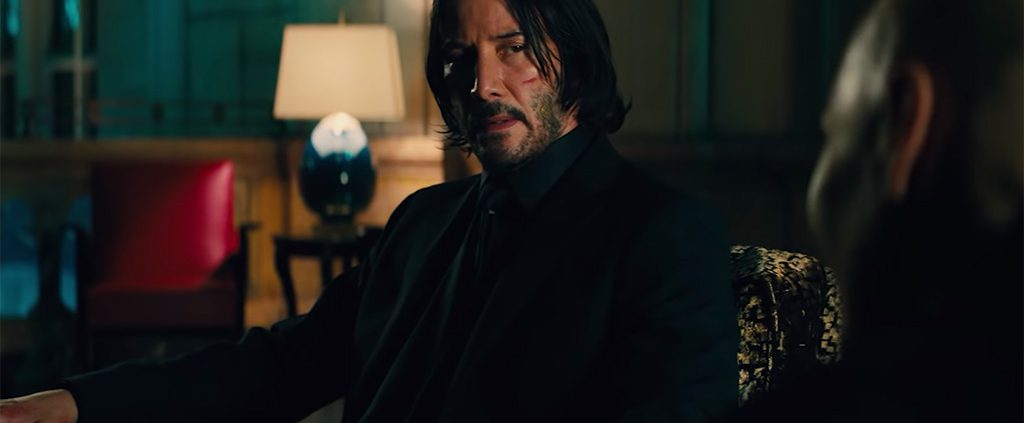John Wick 3: Parabellum and the Elusive Quest for Peace
Screenshot taken from Official Trailer
Written By Simon Moetara, New Zealand
Rating: 3.5 stars out of 5
The neo-noir action thriller John Wick 3: Parabellum (2019) knocked Avengers: Endgame off its top perch in the US box office with an estimated US $57 million gross in its opening weekend. The über-violent series follows the story of John Wick, a legendary, near mythological assassin who has been personally responsible for 299 deaths in the series to date.
In the first film John Wick (2014), we meet Wick (Keanu Reeves), who is deep in grief, having lost his wife Helen to a terminal illness. Wick receives a posthumous gift from Helen, a puppy named Daisy. The story kicks into action when a trio of Russian gangsters break into his house to steal his beloved 1969 Ford Mustang Mach 1 and kill Daisy.
It’s then that we find out that John Wick was formerly a hitman, nicknamed “Baba Yaga,” (translated in the film as “the Boogeyman”), a much-feared assassin who had left his previous violent life to marry the woman he loved. Now he’s back, and people are going to pay.
The 2017 sequel has Wick making new enemies on The High Table, a council of top-level crime lords that rule over an immense quasi-religious bureaucracy that controls the world’s most powerful organized crime syndicates. Wick kills a bad guy on the “consecrated ground” of the Continental Hotel in New York, a felonious “city of refuge” where “no business” (i.e., “killing”) can be conducted. As such, John Wick 2 ends with Wick declared “excommunicado,” a bounty of $14 million placed on his head, and an hour headstart before every assassin within the city will be after him.
John Wick 3: Parabellum (2019) begins where Wick 2 left off, with Wick on the run through the neon-lit, rain-soaked streets of New York, and the clock ticking.
The film has elements from a number of action genres, including western, chanbara samurai cinema, ninja films, gangster crime, and kung fu flicks. The action sequences are often brutal but brilliantly choreographed, kinetic showpieces that far surpass the balletic violence of John Woo and the Wachowski brothers.
You still need something, someone, to love . . .
As I watch the series again, I can’t help but see John Wick as a man who desires to love and to be loved. After all, that’s why he got out of the business in the first place. In Wick 1, the love of his wife Helen called him to a better way of life. When she dies, she organizes for him to receive a puppy, telling him in a card that, “You still need something, someone, to love. So start with this.” The gift of the puppy was “an opportunity to grieve unalone,” and the dog’s death left him devastated. When a price is placed on his head, his friend and fellow-hitman Chris (Willem Dafoe) chooses to help him, and dies as a result.
In Wick 3, we find out that Wick was an orphan from Belarus, the last of his tribe of Ruska Romani, raised in the harsh and unforgiving world of Russian organized crime. In the face of the rules and consequences of the implacable High Table, Wick chooses relationships over regulations, friendship over fidelity to the organisation. However, the dark underworld of assassination is not a world where values like love and friendship can exist untainted by the cruelty and ambition of its denizens.
Revenge may be sweet, but is it nourishing?
Revenge flicks have always been popular, whether it was the satisfaction derived from Inigo Montoya’s revenge on the six-fingered man for the death of his beloved father in The Princess Bride (1987) or Liam Neeson unleashing his “very particular set of skills” to rescue his kidnapped daughter in Taken (2008). We love seeing the powerless empowered to get even, and the bad guys get what’s coming to them.
Psychiatrist Grant Brenner notes that revenge can indeed be initially sweet. When we are socially insulted or humiliated, an initial retaliatory act can help to restore our feelings to a more positive state. However, there is an issue. The action of revenge would likely injure the original offending party, and “the other would then feel motivated to use retaliation to restore their emotional state, leading to an infinite regression of retaliatory aggression.” An endless cycle of pain and suffering, as hurt people continue to hurt people.
However, no matter how delectable a dish revenge might seem, as Christians we are called to dine on a different dish. The apostle Paul writes, “Dear friends, never take revenge. Leave that to the righteous anger of God. For the Scriptures say, “I will take revenge; I will pay them back,” says the Lord” (Rom 12:9 NLT). We are commanded, as children of a God who forgives, to forgive others.
Author Philip Yancey points out that, “Forgiveness alone can halt the cycle of blame and pain, breaking the chain of ungrace.” Forgiveness offers us a way out from bitterness and the need to “get even.” It doesn’t settle all questions of fairness and blame, but it does allow an opportunity for a relationship to start afresh, and for a person to move on in life unencumbered by hostility and resentment. Best we take our pain and hurt to God and leave the “revenge” in his hands.
When we love our enemy, there is the opportunity for reconciliation and peace. None of that is likely if we forge ahead with retaliation and payback. When our focus is on the wrong done to us and the pain we feel, then the desire for revenge grows and consumes us. When we know ourselves as deeply loved, we can “let go” of the need to get even, our gaze firmly on the One who loves and accepts us.
Perhaps this is where fantasy and reality, art and life, must separate for different courses. A film where John Wick lays down his guns, knives, sword or axe and seeks to forgive and work according to restorative justice principles might well bomb at the box office, but as a narrative would certainly provide hope for a better quality of life.
After her death in the first film, John’ wife Helen sends him a card saying, “And now that I have found my peace, find yours.” As Wick prepares for the final battle in Wick 3, one character intones, “Si vis pacem, para bellum,” a Latin adage translated as “If you want peace, prepare for war.” Revenge rarely ever brings peace, and retaliation generally escalates the conflict or creates immense pain and damage.
As Wick 3 ends, Helen’s desire for peace for her husband seems doubtful. Wick’s initial desire for vengeance spirals, as obligations and consequences call him into ever-increasing cycles of mayhem, destruction, and violence. The end of Wick 3 leaves it wide open for the next instalment, which is great news for action fans and excellent for the box office, but offers little hope for the opportunity for brother Wick to find his peace and escape the violence he longed to leave behind.










Leave a Reply
Want to join the discussion?Feel free to contribute!